Greasy countertops, oily dishes, and a film of grease all over your stove – these are just some of the headaches that come with cooking in the kitchen. While we may love indulging in delicious fried foods or whipping up creamy sauces, dealing with greasy messes afterwards is often not as enjoyable. Not to mention, excess grease can also pose health hazards and lead to clogged drains.
If you’re tired of constantly battling against grease in your kitchen, fear not! In this blog post, we’ll be sharing some tips on how to avoid grease in the kitchen and keep your kitchen clean and shiny. So put on your apron and let’s dive into the world of degreasing techniques and preventative measures.
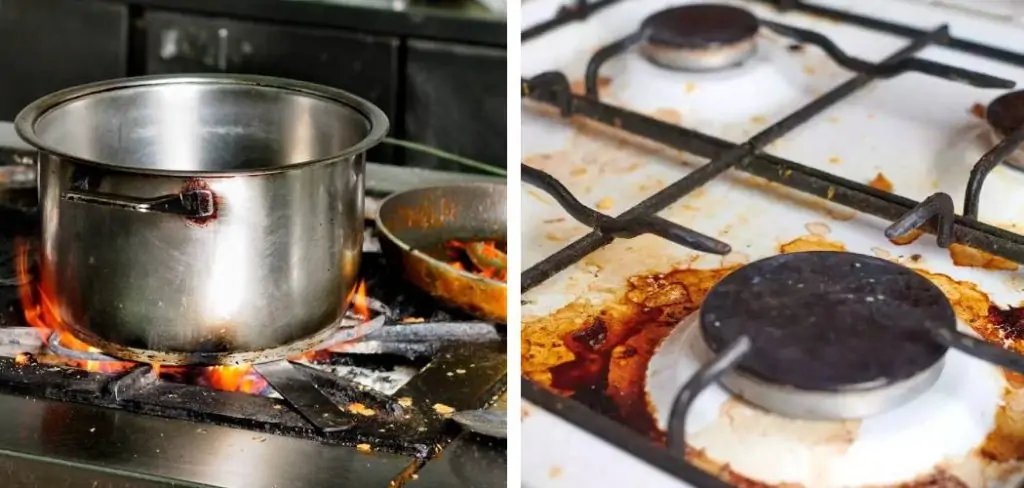
Causes of Grease in the Kitchen
Before we get into how to avoid grease, let’s first understand why it happens in the first place. Grease is formed when oils or fats are heated and then cooled, causing them to solidify. This can happen during cooking when hot oil splatters onto countertops or dishes, or when greasy foods are left on surfaces for too long. Grease can also accumulate over time from cooking and food preparation, creating a build-up of grime on kitchen surfaces.
Tips on How to Avoid Grease in the Kitchen
1. Use a Splatter Screen
One of the easiest ways to avoid grease in the kitchen is to use a splatter screen while cooking. This simple tool can be placed over pots and pans, limiting the potential for oil and grease to splatter onto your stove, countertops, and potentially the floor. It allows steam to escape while keeping the grease contained, also ensuring your food doesn’t become excessively greasy. Remember to clean your splatter screen regularly to prevent any grease build-up and maintain its effectiveness.
2. Bake Instead of Fry
Yes, fried foods can be delicious, but frying also results in a lot of grease in the kitchen. Instead, consider baking your favorite dishes. This cooking method minimizes the use of oil and therefore generates considerably less grease. Additionally, baking often makes for a healthier meal, as it typically involves less fat and fewer calories than frying. From crispy baked chicken to golden baked fries, you’ll be surprised at how many of your favorite fried foods can be just as appetizing and less greasy when baked. Plus, you’ll save yourself the trouble of dealing with a messy, greasy kitchen afterwards.
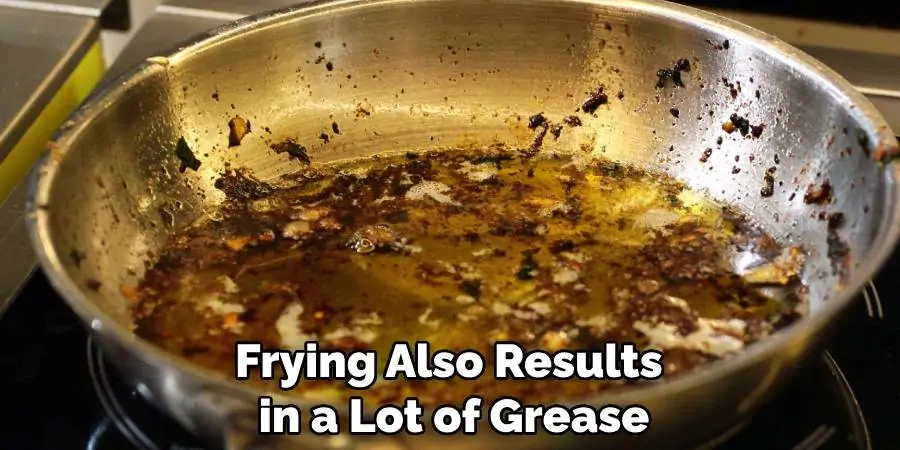
3. Invest in an Oil Separator
If you frequently cook with oils or make homemade dressings and sauces, investing in an oil separator can help reduce the amount ogresses in your kitchen. These tools are designed to separate the oil from other ingredients, allowing you to pour off the top layer of oil while leaving any sediment or impurities behind. An oil separator often comes with a strainer to trap any solids, and a spout positioned at the bottom, enabling you to pour the oil-free broth or sauce while the excess oil remains in the separator.
By using an oil separator, you can reduce the grease in your dishes, keep your kitchen cleaner, and also make your meals healthier. As a bonus, these tools are usually dishwasher-safe, making cleanup a breeze. Remember to empty and clean your oil separator after each use to keep it working at its best.
4. Keep Your Stove Clean
Grease buildup on your stovetop can not only be unsightly but also pose a fire hazard. Regularly cleaning your stovetop with hot soapy water and a good-quality degreaser can effectively tackle stubborn grease stains. For best results, clean the stove after each cooking session, but make sure it’s cool before you start. Wiping away any excess grease immediately helps prevent buildup and makes it easier to clean up after cooking. Employing these preventative measures, such as regularly cleaning your stove and immediate cleanup of spills, can drastically reduce the presence of grease in your kitchen.
5. Drain Grease Properly
When cooking meats that produce a lot of grease, such as bacon or ground beef, make sure to drain it properly before disposing of it. Never pour hot grease down the sink as it can lead to clogs and other plumbing issues. Instead, pour the grease into a heat-resistant container, like an old coffee can or glass jar, allow it to cool and then dispose of it in the trash. If it’s a small amount, you can also soak it up with some paper towels and throw those away. These simple steps will prevent grease from building up in your pipes and keep your plumbing system running smoothly.
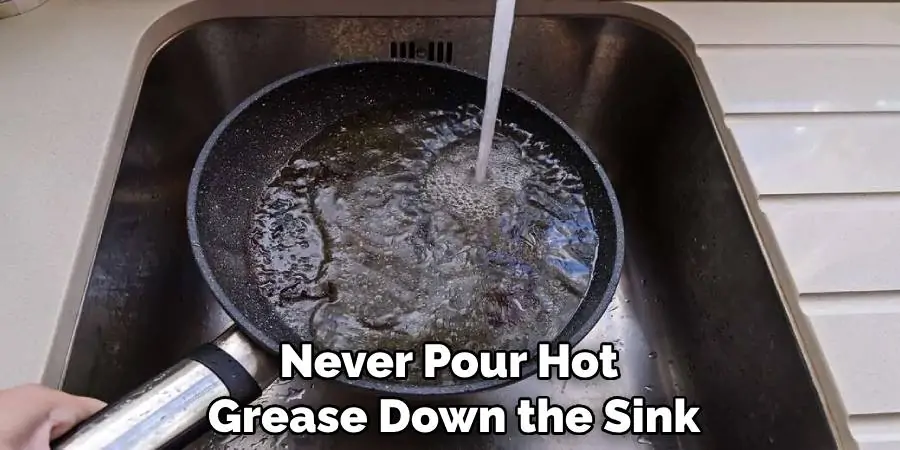
7. Use Paper Towels or Newspapers
When frying foods, instead of placing them directly onto paper towels to absorb excess oil, try using newspapers instead. They are typically more absorbent and won’t leave behind small pieces that paper towels often do. After frying, simply drain the food on a layer of newspaper to soak up extra oil. For an even better result, you might want to place an additional layer of newspaper on top and gently press to blot out even more grease. Dispose of the oil-soaked newspapers responsibly, and enjoy a less greasy, but still delicious, meal.
8. Use Less Oil When Cooking
One way to avoid excessive grease in the kitchen is to use less oil when cooking. You can also try using healthier oils, such as olive or avocado oil, which contain healthier fats and are less likely to splatter. Alternatively, you can use non-stick pans or cooking spray to reduce the amount of oil needed for cooking. Non-stick pans have a special coating that allows food to brown without sticking to the pan, meaning less oil is necessary. Similarly, cooking spray can be used to lightly coat your pan or baking dish, providing a non-stick surface with less oil consumption. These options not only help to reduce the grease in your kitchen but also make for a healthier cooking method.
8. Properly Store Grease
Once you’ve stored your excess cooking grease, it’s important to dispose of it properly. You should never throw liquid cooking grease directly into the trash as it can leak, creating a messy and potentially hazardous situation. Instead, wait until the grease has solidified in the refrigerator. Once solid, it can be scraped into a sealable plastic bag and then disposed of in your household waste. This method ensures that the grease is contained, reducing the risk of spills or leaks that could create a greasy mess in your kitchen. It’s a simple step but a critical one in maintaining a clean and safe kitchen environment.
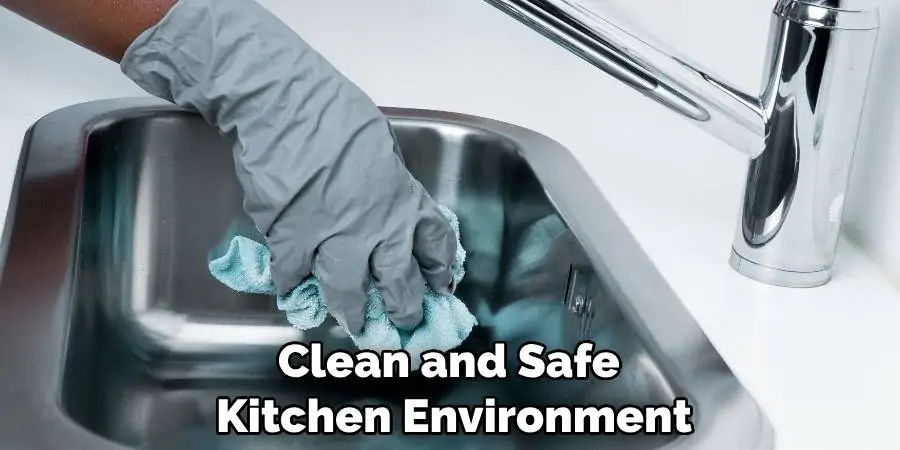
Frequently Asked Questions
What Causes Grease in Kitchen?
Grease in the kitchen is typically caused by cooking methods that use oil or fat, such as frying, sautéing, and roasting. When these oils are heated, they can splatter and spread, coating surfaces with a layer of grease. Grease can also come from fatty foods like meat or dairy products that release their natural oils when cooked.
What is the Best Solution for Kitchen Grease?
Whether you are an avid cook or a beginner in the kitchen, grease is an inevitable problem that can be hard to avoid. From greasy splatters on the stovetop to oily residue on dishes, kitchen grease can be a hassle to clean. However, there are several solutions to this problem. One way on how to avoid grease in the kitchen is to use less oil when cooking and opt for healthier cooking methods, such as baking, grilling, or steaming.
You can also cover your frying pan with a lid to prevent oil from splashing. Additionally, wiping down surfaces with a microfiber cloth and a mixture of vinegar and water can help clean up residual grease. By implementing these solutions, you can minimize the amount of grease in your kitchen and keep it a clean, healthy place to cook.
How Do You Manage Kitchen Grease?
To manage kitchen grease, it’s essential to regularly clean your stovetop, appliances, and surfaces with hot soapy water and a good-quality degreaser. You can also use an oil separator to strain excess oil from broths or sauces and dispose of cooking grease properly by allowing it to solidify in the refrigerator before disposal. Additionally, using preventative measures such as wiping up spills immediately and draining grease properly can help reduce the presence of grease in your kitchen. By following these tips, you can effectively manage kitchen grease and maintain a clean, safe space for cooking. End of Section. New content:
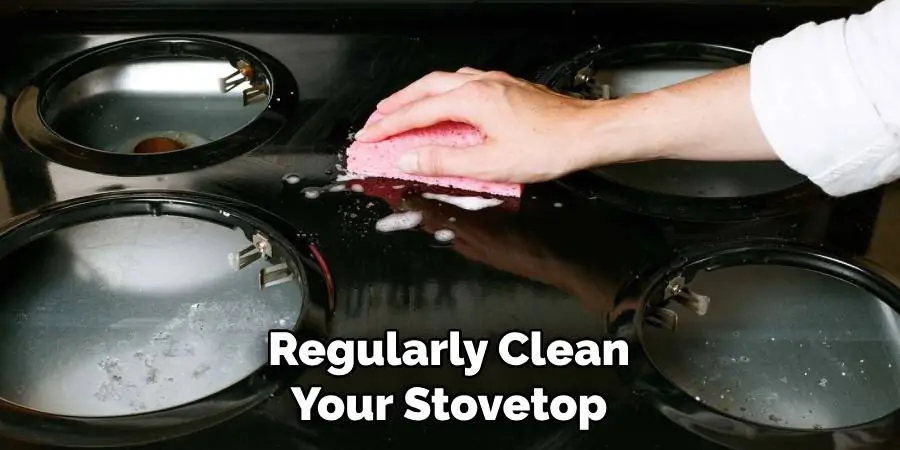
Conclusion
In conclusion, grease in the kitchen can be a nuisance and a health hazard if not handled properly. It is important to take preventative measures such as wiping down surfaces, using a splatter guard, and disposing of grease properly. By following these tips and implementing them into your daily cooking routine, you can avoid grease buildup and keep your kitchen clean and safe. So the next time you step into your kitchen, remember to keep these tips in mind and say goodbye to stubborn grease stains once and for all.
We hope that this blog post has provided you with valuable information on how to avoid grease in the kitchen. Now it’s up to you to put these tips into practice and see the results for yourself! Let’s all work towards having a grease-free kitchen and a healthier lifestyle. Here’s to happy, healthy cooking without the added stress of grease build-up!
